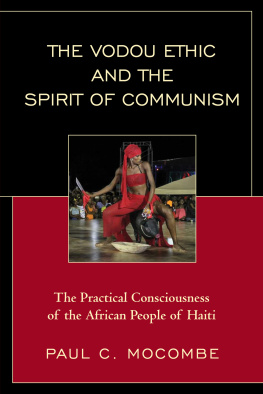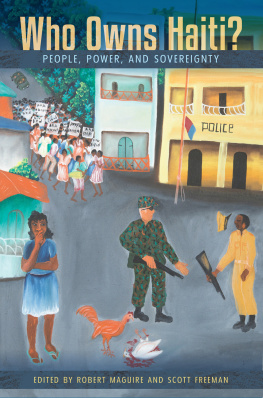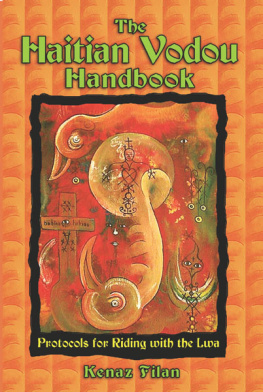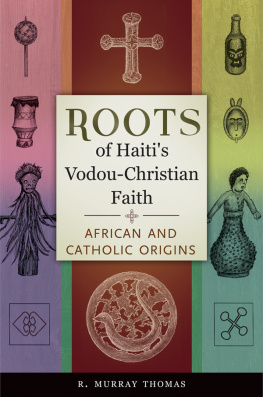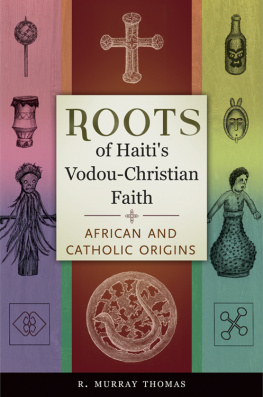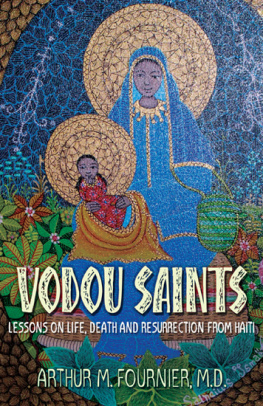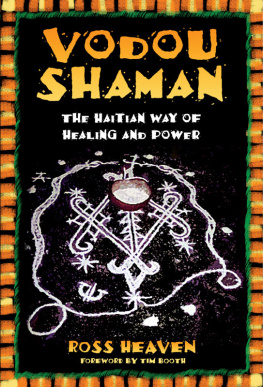KATE RAMSEY is assistant professor of history at the University of Miami.
The University of Chicago Press, Chicago 60637
The University of Chicago Press, Ltd., London 2011 by The University of Chicago
All rights reserved. Published 2011
Printed in the United States of America
20 19 18 17 16 15 14 13 12 11 1 2 3 4 5
ISBN-13: 978-0-226-70381-7 (e-book)
ISBN-13: 978-0-226-70379-4 (cloth)
ISBN-10: 0-226-70379-7 (cloth)
Library of Congress Cataloging-in-Publication Data
Ramsey, Kate.
The spirits and the law : vodou and power in Haiti / Kate Ramsey.
p. cm.
Includes bibliographical references and index.
ISBN-13: 978-0-226-70379-4 (cloth : alk. paper)
ISBN-10: 0-226-70379-7 (cloth : alk. paper)
1. HaitiReligion. 2. Religion and lawHaitiHistory. 3. NationalismHaitiReligious aspectsHistory. I. Title.
BL2530.h3r25 2011
306.6'99675097294dc22
2010043112

The paper used in this publication meets the minimum requirements of the American National Standard for Information SciencesPermanence of Paper for Printed Library Materials, ANSI Z39.48-1992.
ACKNOWLEDGMENTS
I owe an enormous debt of gratitude to everyone who has contributed to the evolution of this book. Its first incarnation was as a dissertation, and thus I begin with my Ph.D. advisors at Columbia University, Michael Taussig and Rosalind Morris, who inspired me through their writing and teaching and guided my work wisely and generously throughout. They always asked in advance the questions that proved most important in the end. John Szweds influence spans every stage of my higher education, from college through graduate school, and I have been the recipient of his scholarly generosity many times over the years. J. Michael Dashs scholarship on Haitian literary history and politics has been a touchstone for my work as long as I have been engaged in these studies, and I have valued greatly his guidance along the way. Although Lannec Hurbon was not a formal advisor for my doctoral thesis, his writing and input have critically shaped the way I think about these histories, as is reflected in the pages that follow. I would also like to thank Barbara Kirshenblatt-Gimblett and Karen McCarthy Brown for their intellectual generosity and mentoring at different points during my development of this study. Sterling Stuckey has encouraged my research since the very first time I presented it publicly, and I am deeply grateful for our scholarly exchange over the years. Finally, I wish to express my gratitude for Cynthia Jean Cohen Bulls intellectual nurturing from the first moments of my graduate education until her passing in 1996. I miss her as a teacher, mentor, and friend.
I am extremely grateful to those who discussed their perspectives on these histories with me, both in Haiti and in the United States. My deepest appreciation goes to Jean-Lon Destin, who for seventeen years has generously shared his memories and analyses of the mouvement folklorique, along with his friendship. In addition, I extend my gratitude to Jean-Yves Blot, Jean Coulanges, Pierre Desrameaux, Etienne Germain, Michel Lamartinire Honorat, Alphonse Jean, Louines Louinis, and Emerante de Pradines Morse. I also wish to acknowledge and honor the contributions of five remarkable women who are gone, but whose inspiration and influence carries on: Katherine Dunham, Lina Mathon-Blanchet, Carmencita Romero, Odette Latour Wiener, and Lavinia Williams.
The debt I owe to those who supported my research in Haiti is enormous. I thank Marvel Dandin and Yanick Guiteau Dandin for their friendshipweekly meetings in Kreyl and English at Radio Kiskeya with Marvel, and afternoon dances classes with Yanickand for their serious engagement and invaluable assistance with my research. In 1991 and again in 19961997 I relied on the everyday support and guidance of the extended Jean-Charles family, with special thanks to Claudie and Antoine for making me feel so at home, and to Glarsnell, Gutteridge, Henseler, Herv, Monge, Nadie, Nadige, and Shirley. I am grateful for the equally generous hospitality of Jacques Bartoli during a shorter period of research in the spring of 1998. I want to thank Florencia Pierre and the members of the folklore troupe Djaka for welcoming me into the community of their company classes several afternoons a week. My thanks as well to Kathie Klarreich and Georges Venel Remarais for the opportunity to work for a time as a translator with LAgence Hatienne de Presse, which supported an extended stay in Haiti. Now that we both live in Miami, more thanks to Kathie for her moral support as I completed the manuscript. I am very grateful to Henry-Robert Jolibois for his generous material support of my research by providing office space at ISPAN, for his help with research questions over years, and for his friendship today. It was my good fortune to overlap in Port-au-Prince with Sara Lechtenberg, who generously shared her own research with me. I am grateful to Eileen Herzog-Bazin for co-organizing a stimulating conference on the history of Haitian folklore dance that advanced my research considerably. Sympson Rinvil was a wonderful partner for language exchange. For their friendship and/or input on the project, I would also like to acknowledge Tamara Apollon, Sharon Bean, Amelia Burgess, Marjorie Celestin, Stania Celestin, Brian Concannon, Laurence Durand, Marie-Lourdes Elgirus, Lucien Maurepas, Donna Plotkin, Nadege Robertson Tippenhauer, and Mushi Widmaier.
One of my greatest debts is to the librarians and archivists who aided my research at collections in Haiti and the United States. In Port-au-Prince, my gratitude goes to Ephle Milc, director at that time of the Bibliothque Hatienne des Pres du Saint Esprit, and to his assistant Sabrina Rveil; to Frre Ernest Even at the Bibliothque Hatienne des Frres de lInstruction Chrtienne, whose generosity and support he demonstrated by opening the library for me on a weekend morning so that I could hand-copy a few remaining materials before leaving town; to the staff of the Bibliothque Nationale, particularly Nadge Constant; and to Eleanor Snare, former director of the Institut Hatiano-Amricain, who made her own extensive library available to me at the start of my research in Port-au-Prince, thereby orienting the project in crucial ways.
In the United States, I wish first to thank for their invaluable assistance the staffs of the interlibrary loan offices of New York University, Columbia University, Ohio State University, Brown University, Princeton University, the University of Pennsylvania, and the University of Miami. My archival research had a fortuitous beginning in the Melville J. Herskovits Papers at Northwestern University. I would like to thank the archivists and librarians there, and also those who supported my research on a short-term research fellowship in the Department of Anthropology, National Museum of Natural History, Smithsonian Institution, especially Jake Homiak; in the National Museum of African Art, also at the Smithsonian; in the Manuscripts, Archives, and Rare Books Division of the New York Public Librarys Schomburg Center for Research in Black Culture, especially Andre Elizee; in the General Research Division of the New York Public Library; in Special Collections, George A. Smathers Libraries, University of Florida, Gainesville, where I was fortunate to make the acquaintance of Keith Manuel, who continued research that I was not able to complete during my visit; at the U.S. Marine Corps History and Museums Division in Washington, D.C., especially Robert Aquilina; in the National Archives and Records Administration, especially Trevor Plante; in Special Collections at Morris Library, Southern Illinois University, Carbondale; at the University of Pennsylvania Museum of Archaeology and Anthropology; at the New York Public Library for the Performing Arts; at the Manuscript Division, Library of Congress; at the Florida International University Green Library Special Collections; by mail, at the Gray Research Center, and the Reference Branch, History Division, U.S. Marine Corps at Quantico; and last but certainly not least, I would like to thank Cristina Favretto, Beatrice Skokan, and Rochelle Pienn in Special Collections at the University of Miami Libraries. Thanks to Katherine Carroll Davis for compiling a helpful inventory of works held by the University of Miami that were relevant to this project.

 The paper used in this publication meets the minimum requirements of the American National Standard for Information SciencesPermanence of Paper for Printed Library Materials, ANSI Z39.48-1992.
The paper used in this publication meets the minimum requirements of the American National Standard for Information SciencesPermanence of Paper for Printed Library Materials, ANSI Z39.48-1992.
